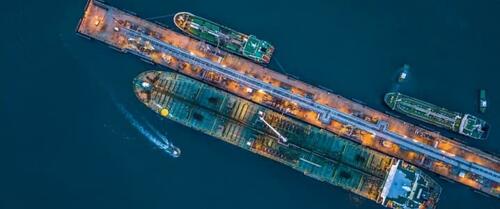
By Tsvetana Paraskova of OilPrice.com
The number of commercial vessels that have transited the Red Sea/Suez Canal route has more than halved over the past month amid rising tensions off Yemen, but more than 100 ships, including oil tankers, have crossed the water lane since the U.S. and UK navies advised operators on Friday to steer clear of the route.
Amid escalating tensions in the Middle East and the U.S. and UK strikes on Houthi targets in Yemen on Thursday night last week, the largest shipping and tanker industry groups advised on Friday members to stay away from the Bab el-Mandeb Strait while shippers were diverting transit away from the Red Sea en masse again.
In an advisory to its members, the International Association of Independent Tanker Owners (Intertanko), representing nearly 70% of all international oil, chemical, and gas tankers, said that tankers should “stay well away” from Bab el-Mandeb and pause north of Yemen when traveling south through the Suez Canal route.
Many have heeded the advice, but some have not.
A total of 114 commercial vessels — including oil tankers, bulk carriers, and container ships — have continued with their routes and transited into or out of the Red Sea through the Bab el-Mandeb Strait, according to vessel-tracking data monitored by Bloomberg.
That’s down from 131 ships crossing the chokepoint during the same days of the previous week, and more than half from the 272 vessels that used the route one month ago, according to the data compiled by Bloomberg.
Since Friday, tensions in the area ratcheted up further, after an anti-ship cruise missile was fired on Sunday from Iranian-backed Houthi militant areas of Yemen toward USS Laboon, which was operating in the Southern Red Sea. The missile was shot down in vicinity of the coast of Hudaydah by U.S. fighter aircraft, and there were no injuries or damage reported, the U.S. Central Command said.
On Monday, the Houthis fired a missile and struck a U.S.-owned merchant vessel—the Gibraltar Eagle, a Marshall Islands-flagged, U.S.-owned and operated container ship. The ship has reported no injuries or significant damage and is continuing its journey, the U.S. Central Command said.
By Tsvetana Paraskova of OilPrice.com
The number of commercial vessels that have transited the Red Sea/Suez Canal route has more than halved over the past month amid rising tensions off Yemen, but more than 100 ships, including oil tankers, have crossed the water lane since the U.S. and UK navies advised operators on Friday to steer clear of the route.
Amid escalating tensions in the Middle East and the U.S. and UK strikes on Houthi targets in Yemen on Thursday night last week, the largest shipping and tanker industry groups advised on Friday members to stay away from the Bab el-Mandeb Strait while shippers were diverting transit away from the Red Sea en masse again.
In an advisory to its members, the International Association of Independent Tanker Owners (Intertanko), representing nearly 70% of all international oil, chemical, and gas tankers, said that tankers should “stay well away” from Bab el-Mandeb and pause north of Yemen when traveling south through the Suez Canal route.
Many have heeded the advice, but some have not.
A total of 114 commercial vessels — including oil tankers, bulk carriers, and container ships — have continued with their routes and transited into or out of the Red Sea through the Bab el-Mandeb Strait, according to vessel-tracking data monitored by Bloomberg.
That’s down from 131 ships crossing the chokepoint during the same days of the previous week, and more than half from the 272 vessels that used the route one month ago, according to the data compiled by Bloomberg.
Since Friday, tensions in the area ratcheted up further, after an anti-ship cruise missile was fired on Sunday from Iranian-backed Houthi militant areas of Yemen toward USS Laboon, which was operating in the Southern Red Sea. The missile was shot down in vicinity of the coast of Hudaydah by U.S. fighter aircraft, and there were no injuries or damage reported, the U.S. Central Command said.
On Monday, the Houthis fired a missile and struck a U.S.-owned merchant vessel—the Gibraltar Eagle, a Marshall Islands-flagged, U.S.-owned and operated container ship. The ship has reported no injuries or significant damage and is continuing its journey, the U.S. Central Command said.
Loading…





